HIT CHANNEL EXCLUSIVE INTERVIEW: October 2024. We had the great honor to talk with an extremely talented musician and a very fine person: Bill Payne. He is best known as a founding member and pianist of the legendary Little Feat. Jimmy Page of Led Zeppelin has publicly said that Little Feat is his favorite American band and their songs have been covered by Bob Dylan, Deep Purple, Phish, Van Halen, Emmylou Harris and others. During his career Bill Payne has played with James Taylor, Jackson Browne, The Doobie Brothers, Pink Floyd, Bryan Adams, Phil Lesh, Bob Seger, moe. and many others. In May 2024, Little Feat released their first studio album in 12 years, “Sam’s Place”, containing 8 blues standards and one new original song. Read below the very interesting things he told us:
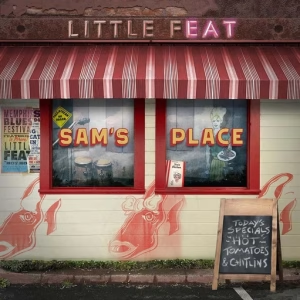 You are currently in West Virginia. Are you satisfied with the way the tour is going so far?
You are currently in West Virginia. Are you satisfied with the way the tour is going so far?
Absolutely, we ‘ve got two horn players with us on this tour, Marc Franklin (trumpet) and Art Admaiston (saxophone), who played both on “Sam’s Place” and on this new record we are gonna release in 2025, called “Strike Up the Band”. I met those guys when I was playing with The Doobie Brothers. Scott Sharrard who plays guitar with us knew these guys when he was with Gregg Allman (ed: The Allman Brothers Band -Hammond, vocals, guitars). In fact, I was with The Doobie Brothers when I met Scott, he was with the Gregg Allman Band. Marc and Art were playing horns that evening, too. We all know each other for a while. The tour is going really well. Sam Clayton (vocals, percussion), had an operation, a medical procedure, so he is not with us right this moment (ed: October 22), he will be on 5-6 days from now towards the end of the tour; he is doing the last four shows with us. He is doing fine, he made a lot of videos telling people he was great and he is, but we wanted to get him a direct flight to us (laughs), so, he doesn’t have to go through too much of airline travel. But he is doing great and we are looking forward to seeing him.
How did you come up with the idea to make a new studio album of blues songs with Little Feat after 12 years?
Well, the idea of doing a record with new songs is probably since we got back together three or four years ago. However, it was preceded by an album called “Sam’s Place”, which is the first album we ‘ve released in 12 years, as you said and that record is all blues. We only have one original song on that one. Yes, it’s going all very well and Sam (ed: Clayton -percussion, vocals) is the singer on that album, so, we are very pleased with that record. But we have 13 new songs on this other album. I wrote 20 songs with Robert Hunter (ed: Grateful Dead lyricist -died in 2019), for example. So, all is well, man.
“Milkman” is the only original song from “Sam’s Place” album. Please tell us everything we should know about this beautiful song.
That song is written by Sam, Fred Tackett (guitar) and Scott Sharrard (guitar) and it was originally called “The Trashman”, you know, it‘s for garbage and stuff and Sam’s wife heard about that and said: “No, you are not gonna use that title”. So, they went back and named it “Milkman”. Sam actually has a nephew who is a milkman, so, that was dedicated to him (laughs).
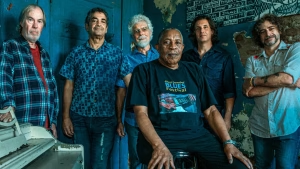 I really like Muddy Waters’ “Long Distance Call” featuring Bonnie Raitt from “Sam’s Place” album. How did this come about?
I really like Muddy Waters’ “Long Distance Call” featuring Bonnie Raitt from “Sam’s Place” album. How did this come about?
From the get go, Thodoris, we were thinking of having Bonnie if she was available to join us. She came down to a show we played, I think it was at the Warfield in San Francisco and after the show, she came back on the bus and we were talking about a few things and a couple of things happened: We were talking about her singing on that one song, which she agreed to, but she also had mentioned another tune, a Willie Dixon song, “You’ll Be Mine”. She thought we had to check it out and I said: “Men, when Bonnie speaks, we listen” (laughs), so, we went to check that one and that’s on the record, too. Bonnie and Sam did not sing the song together, we sent it to her and we are fortunate that everything locked. We are happy, there are no mistakes, but it could be a little smoother than we did it, in terms of recording, but the performance is beautiful. Bonnie and Sam sound terrific, so, everything worked out.
Could you describe to us your feelings while playing Jerry Lee Lewis’ piano on “Sam’s Place” album?
I was told that it was Jerry Lee’s piano and I was thinking: “This is really cool”. I wrote an article once about Richard Manuel’s (The Band) piano, I am thinking about that piano and I am thinking about Jerry Lee’s piano and I said the same thing: “The instrument pretty much played itself”. I mean, I was playing it but it was like: “I couldn’t do anything wrong on it” (laughs). The magic was there. So, I took full advantage of that and I had a ball. It was just so much fun playing.
You have already recorded your next studio album in Nashville with producer Vance Powell (Phish, Chris Stapleton). What will it sound like?
The title of the album is called “Strike Up the Band” and it starts off with a song called “Four Days of Heaven, Three Days of Work” and again we’ve got Marc and Art playing horns with us on it and it sounds like Little Feat. A friend of us, who heard it a couple of weeks ago, said: “That song that comes on it’s just like freight train heading straight at you”. It’s got that medium groove to it: “Tu-tu-tu-pum/ tu-tu/ tu-pum/ tut-tut”. There is no mistake that is Little Feat. The whole record is an eclectic album as a lot of our records are. I’ve got a song on there about New Orleans called “New Orleans Cries When She Sings”. I wrote that with Vince Herman (ed: guitar) who plays with a group called Leftover Salmon. Vince did the lyrics and I did the melody and the chords to it. We had a guest singer, Christine Rogers, who is a friend of Vance’s. Vance and I both produced the album, we had Scott (ed: Sharrard -guitar) come and produce several tracks, too. Christine was a background singer on a lot of stuff with Vance; she is just the best. So, it’s an album that’s right in your face and I couldn’t be happier with that. I mean, I can’t wait for people to hear it, although more likely they will have to wait until next May, so it’s gonna be a while. I was talking to Scott Sharrard today, at the next soundcheck we are gonna run “Four Days of Heaven, Three Days of Work”.
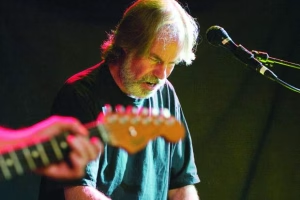 In your opinion, what makes the music of Little Feat still relevant in 2024?
In your opinion, what makes the music of Little Feat still relevant in 2024?
It’s relevant because when you combine good musicianship with good songs, I think right things happen. We can really play, which is to say that the core of the musicianship in Little Feat is and has always been top notch, which allows you not only to play within the structure of the song, but if you need to jam and improvise, you can do that as well. We can also accommodate guests who come in with us, to give them room and to play off of them. So, I think what makes it relevant to fully answer your question is: At once it is conversational, it sounds easy, but if you are a musician and you try to play it, you realize it’s not (laughs). We are not doing it to trick anybody, it’s just the way it is, but obviously I love hanging on to be able to write and play for Little Feat, because you have to be in several bands to do the breadth of music that we play. In one way, it slowed our careers down because people are saying: “What are they? What do they do? What is Little Feat? Is it rock ‘n’ roll? Is it country?” and we do all of that and they are finally saying: “Oh, so, you are gumbo (ed: a type of Cajun -New Orleans- music consisting of a lively blend of styles and sounds) and distill everything into this pot and you stir it up”.
That’s another question: It is very hard to define the style of Little Feat’s music. Did this fact ultimately help or harm the band?
In the long run it helped us because it kept our careers fresh. I’m writing a book about it, in fact. It is called “Carnival Ghosts”, it’s a memoir and I’m just about to finish the volume one; it’s probably gonna be two volumes. When Lowell (ed: George -guitar, vocals; died in 1979) and I first started out the band in 1969, we are talking about what sort of music that we wanna play and we were doing stuff more Zappa-esque, as in Frank Zappa kind of music, instrumental stuff and then we played it for Ahmet Ertegun, who produced Ray Charles, he was the President of Atlantic Records and he said: “Boys, it’s too diverse”. We said: “Ok, Ahmet”, so, we went back to the rehearsal room and we started writing what was going to be on the first album (ed: “Little Feat” -1971), which was pretty diverse, too: “Strawberry Flats”, “Hamburger Midnight”, “Crazy Captain Gunboat Willie”, I mean, the titles themselves suggest that things are not in a straight line. That’s the way we started, but it did hurt us for a while because when the record company wants to sell something they want all wrapped up in a little bow: “Here’s the package” and they weren’t quite sure what to do with us. They did a good job, anyway, but it took a while. Back then, labels were able to nurture artists; they don’t do so much these days.
What is the story behind your song “Cat Fever” from “Sailin’ Shoes” (1972) album?
I was living at Lowell’s house and there was a murder that took place less than half a mile from where he was, it’s the LaBianca Family murder and they were murdered by the Manson Family; Charles Manson didn’t murder them but his followers did. So, I wound up sleeping in his van, because Pattie, his girlfriend and wife, they were having a child, she brought a cat in with her and I was allergic to cats, so, I couldn’t sleep in the house and I slept in the van. Because of the murders and the chaos that was going on in Los Angeles, it was like a sweatbox out there. It was August (ed: of 1969) and I had all the windows rolled up, I was fearful for my life (laughs). It was a horrible scene, I’m sorry to be laughing about it, but it wasn’t a good scene, that’s why I wanted to write a song about this and so I did.
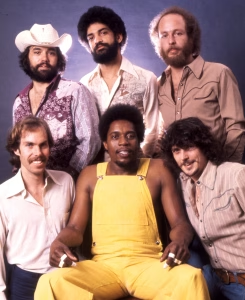 Does “Waiting for Columbus” (1978) live album captures the real atmosphere of a Little Feat concert?
Does “Waiting for Columbus” (1978) live album captures the real atmosphere of a Little Feat concert?
It does. I mean, we recorded that famous album in London, of course, at The Rainbow Theatre and at Lisner Auditorium, which is in Washington, DC in George Washington University. Yeah, we had Tower of Power on horns with us and we did overdubs on that record, though. Richie (ed: Hayward -drums) and I, our parts are pretty much as we played them. There were some overdubs with some vocals and some guitars, but the sound is live. The energy was finally captured. None of the previous albums had that kind of sound to them. I think that’s what it really distinguished that live album from anything else: You felt like you were there. The first time I heard it, the hair in my arms stood straight up and I thought: “Oh my gosh, this thing sounds terrific!”
How did it happen to get Mick Taylor (Rolling Stones, John Mayall’s Bluesbreakers) to play slide guitar on “A Apolitical Blues” from “Waiting for Columbus?
Mick was with the Rolling Stones, of course. The Rolling Stones were well familiar with our band, as we were of theirs, of course, so, it wasn’t a stretch to ask Mick to play. I didn’t ask him, I think Lowell did. We did a Warner Brothers music show in January of 1975, with The Doobie Brothers, Bonaroo, Graham Central Station, Montrose and Tower of Power. There were six bands out there and the press really gravitated to Little Feat, they also gravitated to Lowell George. So, we were hanging out with Robert Plant from Led Zeppelin, the Rolling Stones came to hear us at Jaap Edenhal in Amsterdam, Elton John, whom I didn’t meet, I have never met Elton, but he was at one of the shows and was talking with Lowell. Little Feat was a big deal in Europe, so getting people such as Mick Taylor wasn’t that hard to do, but it was surely great to have him play on it, it was wonderful.
I know there is also a funny story from Paul Barrere’s (future Little Feat guitarist) audition on bass. Would you like to share it with us?
Sure. In the first year that we were putting the band together, which was in 1969, we already had Lowell, myself, of course, and then Richie Hayward. Richie was playing drums with The Fraternity of Man and for those that don’t know that group, they had a song called “Don’t Bogart That Joint”, which was in a movie called “Easy Rider” (1969) with Jack Nicholson and Peter Fonda, a big famous American movie. But we needed a bass player, at one point we thought about Roy Estrada (Frank Zappa & The Mothers of Invention), we also seemed to think about Bruce Barlow who played later with Commander Cody. Bruce is a friend of mine from Santa Maria, which is in Central California. So, we had 14 people over about an 8-months people auditioned to play in Little Feat. Paul Barrere was one of them and he came into the house and said: “Lowell, I don’t know how to play bass” and Lowell said: “Hey, it’s easy, you play guitar. It’s just two less stings” (laughs) and he said: “Oh, ok”. He didn’t make it. I threw a chart in front of him that Stravinsky himself couldn’t have read. But Paul later came back, of course and played guitar.
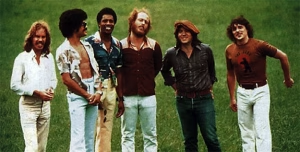 That’s why you said that “This Is Spinal Tap” (1984) is a very accurate film.
That’s why you said that “This Is Spinal Tap” (1984) is a very accurate film.
It was. I mean, the first time I saw “Spinal Tap” I was like: “What is this? I know it is supposed to be funny, but it’s not funny because it is so real”, but it was. By the way, at one of our rehearsals years later, Spinal Tap was rehearsing next door to us, they all came in, Harry Shearer, whom we ‘ve known for a long time; Harry came with the rest of the guys. It was just great, man. You must be a musician, right, are you?
I have my Strat guitar but I’m not very good.
At least, you are a musician, I felt that you were, because you are related to “Spinal Tap”. Because anybody who has ever been in a band understands all the cool things: “Turn it up to 11, mate!”, just all the arguments that go down, the girlfriends and wives that come in that are crazy and the record company people saying: “Yeah, you are gonna make it bigger than Bugs Bunny, mate, don’t worry about it” and you say: “Oh, ok, yeah!” and of course nothing happens. They had everything lined up that was just as crazy as this business ever was and ever will be.
Did you feel a lot of pressure when you reformed the band without Lowell George (vocals, guitar, harmonica, producer -died in 1979) in 1987?
Yes, there was pressure, I think aptly so. You can’t replace Lowell George, right. There was a group that Jeff Beck was in, The Yardbirds. I went to hear them with some friends at Rose Garden, which was in Pismo Beach. We got up there and Jeff Beck was not playing and we were shouting: “Where is Jeff?” and we were getting pissed off and the guy starts to play the guitar, whoever was, and we said: “He sounds good”. It was Jimmy Page up there. So, years later I thought: “Lowell’s gone”. We did a lot of rehearsal at a place called The Alley before I went on tour with Bob Seger, and although it was difficult at first to remember the songs, what transpired that day was: We still sounded like Little Feat. There was still a real power to the band and I thought: “Alright” and I talked to Paul (ed: Barrere -guitar) about that: “Maybe, we have to consider putting this group back together” and I did it based on The Yardbirds and about Jeff Beck not being there. I mean, you can’t replace Jeff Beck, but Jimmy Page was doing good, right, so, I thought: “We can’t replace Lowell but if we have new music that we write, that sounds like us and if we ‘ve got the vocals and everything together, we are not gonna pull everybody in, but ‘ll pull a lot of people in” and we did. We hold that same act to this day. You can’t replace Richie Hayward or Paul Barrere but Tony Leone, who plays drums with us now, a friend of mine from the Midwest, said the best compliment: “Tony is not Richie Hayward. But Richie Hayward is not Tony Leone either”. It’s been well said. They are both amazing musicians and we still sound like Little Feat.
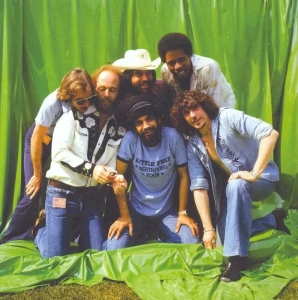 Obviously. Was Lowell George an easy-going person to work with?
Obviously. Was Lowell George an easy-going person to work with?
He wasn’t an easy-going person to work with, he could be difficult. But he had an easy-going manner about him when he was in a good mood. He felt a lot of pressure, too. He was the leader of the band but the pressure of being the leader of the band really got to him, because of the responsibilities that come with it. Not only everybody in the group itself, but their families, the record company, the interviews you have to do -which I love doing them, so, I am in a good place. But I took some of the heat off him by getting involved with management, record labels and such and he was very capable of it. Another thing that I found very curious about him was that he didn’t like to rehearse. We love to rehearse, we love to get together and play music and just try different things. His idea of trying things out was to write songs like, say, “Rock & Roll Doctor” (ed: from “Feats Don’t Fail Me Now” -1974). He had it on a cassette and then he would take the tape out and with a razor blade would edit it, place it back together and then play it for me saying: “Try this out”. I was saying: “Is it 6 beats or 5 beats (ed: in one bar -6/4 or 5/4 time signatures) ?”, “it this a 7-beat phrase? Ah, I’m gonna make it six”, “that sounds good. Ok, alright” (laughs). He was a genius on a lot of levels, but he was a very quirky guy when it came to sorting certain things out. We butted heads more than a few times.
Were you surprised when “Hate to Lose Your Lovin’” from “Let It Roll” (1988) album reached #1 on Mainstream Rock Charts?
You know, I wasn’t. I felt like that song really resonated. It’s like the time you heard Little Richard, “Tutti Frutti” or one of those kinds of songs. This song had that kind of vibe to it. I’m sure some people who might have heard it said (ed: without excitement) : “Aaah, it’s ok”, but most people who heard that said: “Oh my gosh, look out!” I’ve played on certain records and that song and “Four Days of Heaven, Three Days of Work”, I’m not gonna say it’s a hit record, but you know when you ‘ve got something that really comes down the pike. “Hollywood Nights” (1978), when I played on that for Bob Seger I thought: “Man, that thing just rocks”. The same thing with something that was not a rocker, it was a tune that Rodney Crowell wrote called “Shame on the Moon” (ed: 1981 -covered by Bob Seger on 1982’s “The Distance” album), a country song. That tune, I really felt would do quite well. I don’t know at all, but it has been quite a few times in my life when I played on something, like on Bryan Adams’ “(Everything I Do) I Do It for You” from the “Robin Hood” (1991) movie, I knew that this thing was just gonna be a smash hit. I played on Jimmy Buffet’s record “License to Chill” (2004), I knew that was gonna be a big album. I don’t know, I just walk in and do the best I can and I hope for the best, but sometimes you know.
How much has your approach to piano changed over the years?
It hasn’t changed all that much. I’ve always held that the instrument is challenging, the facility of which I play is backed up by a very important exercise that my piano teacher taught me when I was a little kid, which is to play either in thin air or on a desk (ed: without an instrument), which keeps my chops together. When I ‘m at home, I’ll put on the music of Mozart or Bach, Beethoven sometimes, maybe some Haydn and that allows me the facility through fingering, in other words, how to finger a phrase and to have a vocabulary as a guy that writes music, as well. So, I play the piano and I try to play it as if I always had, as a conversation: What I’m trying to say and what I want to say. That’s the way I utilize it, but my view of it has not changed that much, but the ability to articulate it has changed. I know what I’m doing but it’s not in stone; I don’t write it like this is the way it’s got to be. I’m flexible when it comes to playing, but I do what you do: You listen to things and think: “Ah, that sounds cool. Can I play a little bit of that and can enter it into what I wanna do as musician?” You try out. I do the same thing, too.
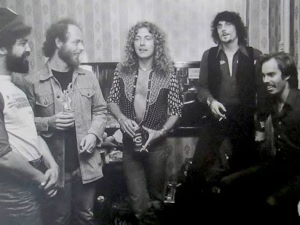
Is it flattering that Little Feat are Jimmy Page’ favorite American band?
Those things are so humbling. Like I said, when I saw him I thought: “Oh my God! That guy is good” and Jeff Beck was not forgotten but he was thrown to the side for a while (laughs), because that guy was good, too. But to have somebody like Jimmy Page or Elton John like Little Feat is amazing. I mean, John Belushi (Blues Brothers) told me: “I would love to do the Lowell George story someday” and he would have been perfect. John died much in the same way Lowell did, which is unfortunate and very sad, but he was such a talented person as was Lowell. When Lowell and I put the band together in ’69 we didn’t feel we will be ever a household word, but we were very hopeful that within the music community we would mean something and we certainly have. So, mission accomplished there. I look at John Coltrane (saxophone) for example, the last band he ever had, was just spectacular. I’m pretty sure that John wasn’t denigrating anybody or any band or members that came before that, but he was on a very good curve at that point. I feel the same way with Little Feat in the band that we have at our disposal now. Fred Tackett said it very nicely: “This band can play anything” and we really can. I mean, we are not gonna play certain styles but everything is lined up for us: We are up there and improvise on things and this is taking us somewhere. If we can take ourselves in a place, we can take the audience there with us.
Dο you have any memories from your recording on Pink Floyd’s “A Momentary Lapse of Reason” (1987) album?
That record was done at 10:00 in the morning. I got a call from Jeff Porcaro (ed: Toto, Steely Dan -drums), who was hanging out with David Gilmour. He said: “Hey man, they want you to play on the record” and I said: “Oh yeah, that’s cool”. So, I got down there at 10:00 -which is a little early (laughs), but it didn’t matter, it’s five o’clock somewhere, I guess-, I’m sitting there and I start to play on the B3 (ed: Hammond organ) and Bob Ezrin, who was the producer asked me: “Hang on! Could you do the “rrrrnnn” (ed: a run) go up to high C on the instrument and then go down to the A F# D (ed: chord) ?” and I said: “Ok”. In the entire track the guy told me what to play. David Gilmour was there and so was Jeff, neither one of them said: “Hey, let the guy do his thing”. I said: “Well, if I’m gonna be Bob Ezrin’s vessel, to do what Bob Ezrin wants, then, I’ll just do that”. So, I did. I just turned off my mind and I just did what he asked me to do. They did throughout the whole tune. Later, my sense was that it wasn’t their best album and I said: “Yeah, I wonder why”.
Do you remember the title of the song?
I don’t, actually. I just blanked out on. Every now and then, you ‘ll get with somebody that is over-apt to tell you what to play, which is fair game. I mean, I’ll take directions from people, but I never ever had anybody other than Ezrin that didn’t even allow me one note to do that I thought that might be fitting in there. It was strange, but it was Pink Floyd and I take some pride in having played on it, so, it was good.
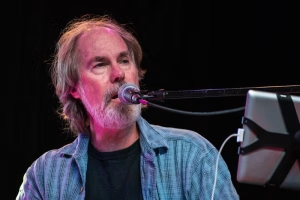 You wrote many songs with Robert Hunter (Grateful Dead lyricist). What was it like to work with him?
You wrote many songs with Robert Hunter (Grateful Dead lyricist). What was it like to work with him?
Robert Hunter is, was, will always be a genius as a wordsmith, he was very territorial about what he wrote. I know Bob Weir (ed: Grateful Dead -guitar, vocals) went into trouble when he tried to change some of his lyrics. I tried to suggest a change a couple of times by actually saying: “Hey, aren’t you say this?” and I got shot down immediately. So, I said: “Bob, I wouldn’t sing it like that, I wouldn’t say it like that. You can write back something else that is not only good but even better”. We wrote 20 songs with each other, but Theo, here’s another thing with Hunter: I never met him, I never talked to him on the phone (laughs). We did everything by the Internet. I said: “Bob, I’m sure you are a very lovely man”. At one point, he invited me up to his place to have a barbecue or a picnic kind of thing and then he fell ill and he said: “Sorry, we can’t do it this time. Maybe will do it again”. Then, he thought: “Maybe it’s better we don’t get together”. So, I have more than 200 emails between him and myself and I won’t list every one of them in my book, but I’m gonna go through a few of them to let people know how we communicated. I knew him very well, as he did me. I mean, I knew I write music but he taught me how to really put things together. It was extraordinary writing with him.
What was your reaction when the Rolling Stones went to watch Little Feat live at Jaap Edenhal in Amsterdam in 1975?
I was floored, just like seeing Bob Dylan at The Bottom Line in New York and (ed: at a later stage) Dylan came to me, I was with Phil Lesh (ed: Grateful Dead -bass) and he said (ed: he mimics Dylan’s voice) : “Billy, do you remember The Bottom Line?” I said: “Yeah, Bob, you were off-center, right in front of me about four rows back and scared the hell of me”. And I felt that way about the Rolling Stones: I wasn’t scared by them, but I thought about all the records that I’ve heard of theirs and I love the Rolling Stones. Down in the basement later I saw Keith (ed: Richards) and I shouted: “Keith! Oh, Keith!” (laughs) and he pulls me in and he says: “Oh mate, we’re all part of the same cloth”. That was like: “Welcome to the club, Bill”. Really, when you think about it, musicians are like Groucho Marx: We would never join a club that would accept us as a member. The idea that Keith Richards was saying: “Welcome to the club”, I ‘ve actually done it to a lot of musicians, too and I’ll say to you too: Welcome to the club, Thodoris. As a musician, we are all in the same place. We go through very similar things, despite how we play or what we do, but we are in something that a lot of people can’t say that they ‘ve done, which is playing music and playing with others, being rejected, had roses strewn at them, we just go through a lot of stuff. What we all share is the same thing called “music” and our ability to share that with others.
Main photo: Polly Payne
A huge “THANK YOU” to Mr. Bill Payne for his time. I should also thank Mr. Dennis McNally for his valuable help.
Official Little Feat website: https://www.littlefeat.net/
Official Little Feat Facebook page: https://www.facebook.com/LittleFeat
Official Bill Payne website: https://billpaynecreative.com/

